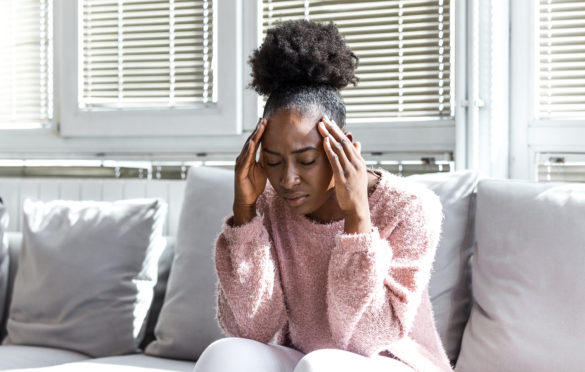Signs of a Struggle | How to Identify and Combat Depression Symptoms

January 20, 2022, marked the second anniversary of the first case of COVID-19 in the United States. Wow. The virus and its effects crippled our economy and society as a nation. Recurring lockdowns, healthcare shortages, and increased mortalities are just a few of the obstacles Americans faced collectively. Individually, we navigated multiple barriers, including COVID-19 induced illnesses, financial crises, and depression.
Studies conducted at the height of the pandemic revealed depression rates among American adults had more than tripled compared to pre-pandemic figures. Though researchers and healthcare professionals alike anticipated an increased prevalence of depression following the national crisis, the phenomenon of prolonged depression (levels that remained high for more than 12 months after the start of the pandemic) was unforeseen. But with everything going on in the U.S. today – in addition to the pandemic – it is understandable that feelings of worthlessness, persistent low mood, and suicidal ideation have affected so many. As we enter a new pandemic era where researchers and scientists develop new strategies to mitigate COVID-19 and its effects, we must also focus on implementing strategies to combat depression.
So what is depression, if not the typical feeling of sadness, that affects almost everyone? Psychologists agree that a critical difference between the two is duration – the length of time that feelings of sadness persist. Though medical experts advise that a mental health professional diagnose depression, there is information to guide laypersons on recognizing depression in themselves and others. These resources are available to help eliminate suicide – the 10th leading cause of death among Americans in the United States and the 2nd leading cause of death among U.S. citizens ages 10 – 34.
If you or someone you know has experienced the following symptoms for periods exceeding two weeks, it may be time to seek professional help.
- Feelings of worthlessness
- Loss of interest or pleasure in things that used to provide contentment
- Feelings of deep guilt
- Fatigue
- Difficulty concentrating
- Anxiety, irritability, or rage
- Physical aches and pains not resolving with time
- Changes in weight and/or appetite
- Suicidal thoughts or attempts
Identifying these signs can be vital in preserving your life or the life of someone you know. If you have experienced thoughts of suicide, contact a medical professional immediately. For a more comprehensive list of depression symptoms, visit this link. For confidential support and crisis resources, call 1.800.273.8255.
…
There are also various small ways to help improve depressive symptoms in our everyday lives. Let’s take a look at some below.
- Develop a routine. Setting a schedule can help us regain control of our lives and give us something to look forward to consistently.
- Challenge the negative voices in your head. As depression seeps in, voices in your head can reinforce negative concepts you’ve been taught previously or introduce destructive new thought patterns. Experts recommend challenging these voices. Use your logic to analyze these thoughts individually to determine if any real evidence supports them.
- Change your diet. For years, dieticians and nutritionists have advocated for dietary changes in the conversation about depression, because there’s a direct link between the foods we consume and the chemicals released in our brain. If we find ourselves in a prolonged state of sadness, it may be helpful to adjust our food intake to include calming options like fruits, vegetables, and legumes.
- Exercise. For some people, exercise can be as effective as antidepressant medication, according to Dr. Michael Craig Miller, assistant professor of psychiatry at Harvard Medical School. His advice? “Start with five minutes a day of walking or any activity you enjoy. Soon, five minutes of activity will become 10, and 10 will become 15.”
- Listen to music. The psychological benefits of listening to music are far-reaching, and one of its most significant effects is the ability to improve our mood. Research suggests genres like classical and meditation music provide the most benefit, but any upbeat tune may do the trick.
- Meditate. Studies suggest that as few as five minutes of meditation daily can help boost our mood. And it’s free!
- Get proper rest. Sleep recharges our bodies and increases energy levels. Ensuring that we have enough rest is a vital part of our emotional well-being.
For more information on natural ways to alleviate depression symptoms, read here. But remember, there is no shame in seeking the help of a medical professional. Major depressive disorder is an illness that affects millions of Americans, so you are not alone! Be courageous and know that when you seek help, you are showing up for yourself in a major way. Love and Hugs!






Malik J Matthews
The practice of meditation and reflection of self and life, gave me a different perspective of life. I’ve been practicing meditation since 2019 and it’s like a breath of fresh air and brings me back to reality. Very helpful. Great article!
RMF
Diet, exercise and meditation have all helped me in these past few weeks. YES to being able to recognize signs you’re struggling and creating healthy habits to make changes. Love this article!